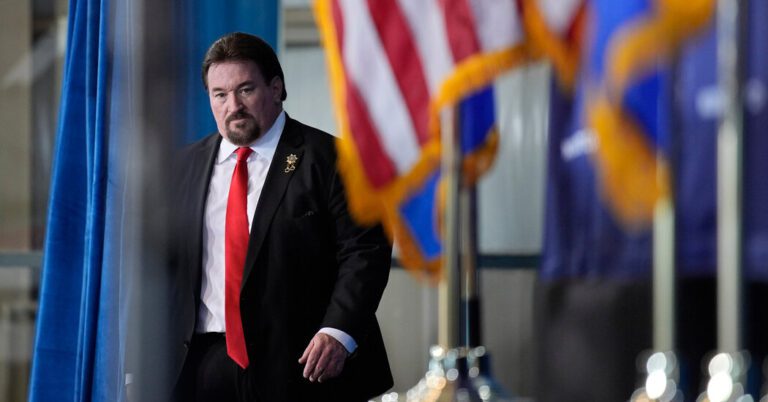
[ad_1]
Before the chairman of Nevada’s Republican Party introduced former President Donald J. Trump at a campaign event last month, he casually referred to a telling private conversation they’d had.
“When I talked to the president, I said, ‘I guarantee you, Nevada will show up, and we will deliver you 100 percent of delegates for the state of Nevada,’” the chairman, Michael J. McDonald, told hundreds of Trump supporters gathered in Las Vegas.
Mr. McDonald’s brazen prediction about the caucuses on Thursday stems from his state’s unusually bifurcated nominating contest, the culmination of Mr. McDonald’s closeness with Mr. Trump — an alliance that led to criminal charges for the chairman — and his stewardship of a state party that has fully embraced the former president’s populist conservatism.
Nevada law requires the state to hold a Republican primary, but Mr. McDonald resisted it. His party will instead award delegates based solely on caucuses held by the party on Thursday night, in which Mr. Trump will be the only major candidate on the ballot.
The lack of drama in part reflects the vicissitudes of politics: Other candidates did decide to participate in the caucuses, and paid the party a required $55,000 for the privilege, but they have since dropped out of the race.
Still, many of them grumbled about caucus rules that the party enacted to benefit Mr. Trump. And Nikki Haley, the former governor of South Carolina and the former president’s chief competitor for the Republican nomination, opted for the primary after deciding the caucuses were biased, a criticism shared by some Nevada political observers, who laid blame on Mr. McDonald.
“I believe that he and the Trump campaign decided that they could control the caucus vote better than an open primary election,” said Chuck Muth, a conservative political activist. “And he used his position as chair to push for it.”
The caucus rules the party enacted under Mr. McDonald’s leadership put another onetime Trump rival, Gov. Ron DeSantis of Florida, at a disadvantage by effectively keeping the super PAC supporting him from taking part.
Mr. McDonald, who did not respond to requests for an interview, had said he would remain neutral in the state’s nominating contest. But twice in recent months he has taken the stage at campaign events for Mr. Trump. (He was not alone in doing so: Iowa’s Republican chairman took the stage in that state under similar circumstances.)
Mr. McDonald’s yearslong loyalty to Mr. Trump has extended to promoting the former president’s lies that the 2020 presidential election was stolen from him. He was one of six Republicans who signed false certificates awarding Nevada’s electoral votes to Mr. Trump, even though Joseph R. Biden Jr. won the state and thwarted Mr. Trump’s re-election bid. The group, which includes the state party’s vice chairman, was indicted by a Nevada grand jury last year and accused of forging and submitting fraudulent documents as part of the scheme.
All six have pleaded not guilty, and Mr. Trump has come to their defense. At a campaign event last year in Reno, he broadly accused Democrats of unfairly persecuting Mr. McDonald for his actions.
“They’re a bunch of dirty players,” Mr. Trump said. “Look at what they’re doing right here to Michael and great people in this state. It’s a disgrace.”
Mr. McDonald, a former police officer, served on the Las Vegas City Council from 1995 to 2003. In 2001, a state ethics commission found that he had violated ethics laws when he urged Las Vegas to enter into a business deal with a sports facility that was partly owned by one of his employers.
Mr. McDonald ultimately left office under a cloud of scandal, losing his re-election bid while facing a public corruption inquiry involving a strip club operator from whom Mr. McDonald had once taken consulting fees. Mr. McDonald was not charged in the case, though he was reportedly interviewed by the F.B.I.
During his years spent outside elected office, he grew more involved in the state party and was ultimately elected its chairman in 2012, swept in by a grass-roots wing that felt marginalized by big donors and the Republican establishment. The next year, Mr. McDonald was re-elected after telling the party he rejected “a top-down” approach to leadership.
“People were angry, upset and fed up,” said Zachary Moyle, a Republican political consultant. “Mike was a voice for those people: activists and volunteers and folks like that, who felt left out of the party system.”
That ideology cleared the way for Mr. McDonald’s backing of Mr. Trump, who harnessed the same anti-establishment sentiment in his rise to power in 2016.
Even as many Republican officials balked, Mr. McDonald was an early supporter, telling The Reno Gazette-Journal that he “struck up a friendship” with Mr. Trump in 2015. He campaigned alongside Mr. Trump in 2016, when Nevada was a crucial battleground state — as it is again this year.
Mr. Muth and Mr. Moyle both said Mr. McDonald’s early and unyielding support for Mr. Trump — who often publicly assails those he finds insufficiently loyal — had been central to his remaining the chair of the state party.
“Find me a more loyal Trump supporter than Mike McDonald,” Mr. Moyle said. “You won’t find one.”
[ad_2]